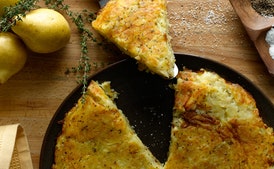
Introduction
Herbed Rösti Potato Cake is a delightful twist on the classic Swiss dish, offering a hearty and flavorful alternative that captures the essence of rösti while incorporating an array of herbs for a refreshing touch. This recipe showcases simple ingredients transformed into a satisfying meal perfect for any occasion.
Tips for this recipe
For the best results, use firm potatoes that hold their shape well when grated and cook over medium heat to ensure even browning without burning. The herbs should be freshly chopped for maximum flavor.
Why you will love this recipe
This Herbed Rösti Potato Cake is not only a feast for the taste buds but also an easy-to-prepare dish that brings a rustic, homely feel to your table. Its hearty texture and rich flavors make it ideal for family meals or impressive dinner parties alike.
Ingredients
3 pounds large Yukon gold potatoes (about 7)
1 tablespoon fresh thyme, chopped
Salt
Freshly ground black pepper
5 tablespoons unsalted butter, melted
1 tablespoon olive oil
Advised equipment
A four-sided grater or box grater, 10-inch well-seasoned cast-iron skillet, or a 12-inch deep nonstick skillet.
History of the recipe
The origins of Rösti can be traced back to Switzerland where it is traditionally made with potatoes and herbs. However, this variation infuses the essence of Swiss cuisine with a contemporary twist by introducing fresh thyme and elevating the dish’s flavor profile. While rooted in Swiss culinary traditions, Herbed Rösti Potato Cake has gained popularity worldwide for its comforting nature and adaptability to various taste preferences, making it a beloved staple among food enthusiasts who appreciate simple yet elegant meals.
Fun facts about this recipe
Rösti is often considered the national dish of Switzerland due to its humble beginnings and widespread popularity. However, Herbed Rösti Potato Cake puts a modern spin on the traditional dish by incorporating fresh thyme – an herb not commonly associated with classic Swiss rösti. This innovation represents the evolving nature of culinary traditions as they adapt to contemporary flavors and palates, highlighting the dynamic relationship between food culture and creativity in the kitchen.



